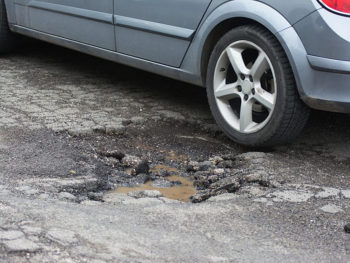Vehicle pothole damage bill rises to £1.25bn
UK motorists spent a total of £1.25bn repairing pothole damage to their vehicles over the last year, but only 0.7% of bills were compensated.

More than half (55%) of drivers suffering damage say they would pay more council tax to spend on roads
The research by Kwik Fit found that more than 10.8 million drivers have suffered vehicle damage due to poor road conditions over the last 12 months with the average bill standing at £115, covering repairs to components such as tyres, suspension and wheels.
For the last three years, vehicle repair bills from pothole damage now total £3.4bn. The cost of this is also likely to rise even higher, according to Kwik Fit as 13% of drivers who suffered damage (some 1.4 million motorists) say they have not yet had the damage repaired. With the coronavirus causing financial uncertainty for many, it is likely that those repairs will be put off for a lot longer yet.
However, on the plus side, a £2.5bn drive to repair 50 million potholes over the next five years was announced in this month’s Budget.
Almost the entire cost of the £1.25bn repair bill has had to be borne by motorists or their insurers as only £8.1m (0.7% of the total) has been refunded to drivers in compensation from local authorities (England and Wales figures).More
Yet a majority (55%) of drivers who have suffered damage would be prepared to pay more council tax, with the average driver willing to stump up 12.5% more. Those who haven’t suffered pothole damage in the last year would be less willing, with only a third (34%) happy to pay more council tax to fund road repairs, with the average acceptable increase just 4.8% on top of their current bill.
Roger Griggs, communications director at Kwik Fit, said: “Unfortunately, every year we are seeing a worsening story when it comes to the condition of our roads and it is the individual motorist who is hit increasingly hard. The immediate impact of coronavirus will mean the demands on public spending will be many, but this should not mask the fact that roads have been underfunded year after year. Once we are out of this crisis, as a country we need to plan investment for the long term and not merely look to patch things over the cheapest possible way.
“For any motorists hitting a pothole, we are operating as normally as possible, so if they have any concerns over potential damage to their car, they should come into one of our centres. We’ll be able to inspect their car while keeping social distancing measures in place and ensure that their car is safe should they need it in an emergency.”












